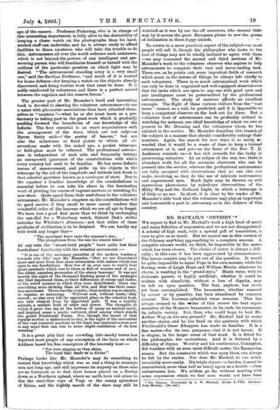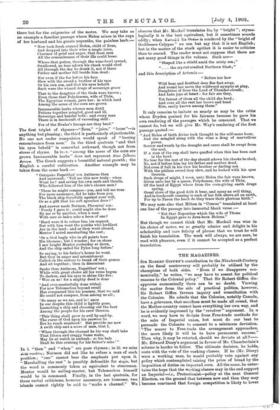MR. 31ACICA_IL'S "ODYSSEY."*
WE expect to find in Mr. Mackail's work a high level of merit and many felicities of expression, and we are not disappointed. A scholar of high rank, with a special gift of translation, is sure to give us so much. But we cannot see in this version of the Odyssey anything approaching to a complete success. A complete success would, we think, be impohsible in the metre which has been chosen. The choice of metre is always a difficulty; in this case it has been aggravated by circumstances.
The heroic couplet may be put out of the question. It would be quite impossible to equal Pope in his own manner, while the flowing verse of Leigh Hunt and William Morris, whatever its charm, is wanting in the "grand style." Blank verse, with its elaborate pauses, is highly artificial ; whether it could be written with simplicity, without a loss of dignity, may be left an open question. The feat, anyhow, has never yet been accomplished. The hexameter, whether scanned by accent or by quantity, has been abandoned by common consent. The fourteen-syllabled verse remains. This has always seemed to the writer of this review the best repre- sentative of the Homeric hexameter, in its rush, its resonance, its infinite variety. But, then, who could hope to beat Mr. Arthur Way on his own ground ? Mr. Mackail had to make another choice, and he h.as fixed on the quatrain with which FitzGerald's Omar Khayyam has made us familiar. It is a fine metre—for its own purposes—but it is not heroic. It is elegiac, in the larger sense of that word. It is fitted for the philosophic, the sententious. And it is fettered by a difficulty of rhyme. Worsley and his continuator, Conington, did wonders with an even more difficult metre, the Spenserian stanza. But the constraint which was upon them can always be felt by the reader. Nor does Mr. Mackail, to our mind, invariably move easily. His triple rhyme—a burden, it must be remembered, more than half as heavy again as a double —often embarrasses him. We seldom go far without meeting with some expression which we feel sure would not have been • The Odyssey. Translated by J. W. Iktsckail. Books L-VIIL London :
John Murray. - (5s. net.] •
there but for the exigencies of the metre. We may take as an example a familiar passage where Helen mixes in the cups of her husband and his guests nepenthe, the painless herb :— " Now took fresh counsel Helen, child of Zeus, And dropped into their wine a magic juice, Charmer of grief and anger, that from men All the remembrance of their Ms could loose.
Whoso that potion, through the wine-bowl spread, Swallowed, no tear adown his cheek would shed All through the day he drank it, not if there Father and mother fell beside him dead : Nor even if the foe before his face Slew with the sword a brother of his race Or his own son, and that his eyes beheld. Such were the wizard drugs of sovereign grace That to the daughter of the Gods were known ; Even those that Polydamma, wife of Thon, The Egyptian woman, gave her: in which land Among the acres of the corn are grown
Innumerable herbs whence men distil Potions together mingled, good and ill, Sovereign and baleful both: and every man There is in leechcraft of exceeding skill :
• For of the Healer's lineage are they bred."
The first triplet of rhymes—" Zeus," "juice," "loose "—is anything but pleasing ; the third is particularly objectionable. No one not under compulsion would speak of "loosing remembrance from men." In the third quatrain "and that his eyes beheld" is somewhat awkward, though not from stress of rhyme. In iv.-v. "among the acres of the corn are grown Innumerable herbs" does not represent Vint Oslopog dipoupec. The Greek suggests a bountiful natural growth ; the English a careful cultivation. Another example may be taken from the same book :—
" Outspake Eupeithes' son Antinous then And answered: Tell me this now truly: when Went he? and saving his own serfs and thralls, Who followed him of the isle's chosen men?
'These he might compass—yea, and tell me true For more assurance, did he take from you The black ship forcefully against your will, Or as a gift that his soft speeches drew?'
And answer made Noemon, Phronius' son: Freely I gave it: could aught else be done By me or by another, when a man With care so laden asks a boon of one?
'Hard were it to refuse him his request. But with him went the youths who lordliest Are in the land : and as they went aboard, Mentor I noted marshalling the rest;
'Or a God haply who in all points bore His likeness; but I wonder; for on shore I saw bright Mentor yesterday at dawn, And the ship sailed for Pylos long before.'
So saying, to his father's house he went. But they in anger and astonishment Called on the suitors to break off their games And sit together; then in discontent
Spake thus Antinous, Eupeithes' son ; While with great choler all his veins begun To darken, and his eyes to shine like fire: Woe on us! for a mighty deed is done 'And over-masterfully done withal. For now Telemachus beyond recall Has compassed this his journey, that we said He could not compass, from among us all ; So many as we are, and lo ! anon In our despite this child is lightly gone, Launching a ship and choosing out the best Among the people for his crew thereon.
"This thing shall grow to evil by-and-by. The curse of God upon his prowess lie Ere he reach manhood! But provide me now A swift ship and a score of men, that I, 'When through the channel he his way shall take That Ithaca and craggy Same make, May lie at watch in ambush: so his bale Shall be this cruising for his father's sake.' "
In I. " then " and " when " are poor rhymes ; in iii. we miss eimt)p voiarroc; Noemon did not like to refuse a man of such position ; " one " cannot bear the emphasis put upon it. "Marshalling the rest" is possibly defensible for gipx4o, but
the word is commonly taken as equivalent to steersman. Mentor would be sailing-master, but Telemachus himself would be in command. Finally, in the last quatrain, for these verbal criticisms, however necessary, are tiresome, two islands cannot rightly be said to "make a channel" We
observe that Mr. Ma ckail translates 3io; by " bright "; etymo- logically it is the best equivalent, but it sometimes sounds oddly; when KotimPidhaelecien, is rendered by the "bright of Goddesses Calypso" we can but say that it is not English; but in the matter of the stock epithet it is easier to criticise than to amend. The reader must not suppose that there are not many good things in the volume. Such are—
"Shaped like a shield amid the misty sea;"
". . . the crystal-cradled Northern blast;"
and this description of Artemis :— "Before her bow Wild boar and fleetfoot deer flee fast away, And round her move the wildwood nymphs at play, Daughters of Zeus the Lord of Thunder-clouds ; And Leto joys at heart : for fair are they,
Yet fairest of them all the child she bred; And over all the rest her brows and head Rise, easily known among them."
It only remains to imitate as nearly as may be the critie whom Dryden praised for his fairness because he gave his own rendering of the passages which he censured. That we cannot do, but we will give Mr. Way's rendering of the first passage quoted :- "And Helen of birth divine took thought in the self-same hour, And she mingled along with the wine a drug of marvellous power. Sorrow and wrath by the draught and cares shall be swept from the soul, If a man of the cup shall have quaffed when this has been cast in the bowl.
No tear for the rest of the day should adown his cheeks be shed, No, not if before him lay his father and mother dead, Not even if full in his view his brother or darling son With the pitiless sword they slew, and he looked with his eyes thereon.
Such drugs of might, I wean, unto Helen the fair were known, Given unto her by a queen, Polydamna, the wife of Th8n, Of the land of Egypt where from the corn-giving earth drugs spring, Great store of the good doth it bear, and many an evil thing, And in leechcraft cunning is each of her folk above all on earth, For up to Paeon the leech do they trace their glorious birth."
We may note also that Milton in " Comus" translated at least one line of the passage into immortal blank verse :— "Not that Nepenthes which the wife of Thone In Egypt gave to Jove-born Helena."
But though we cannot think. that Mr. Maekail was wise in his choice of metre, we so greatly admire and delight in his scholarship and rare felicity of phrase that we trust he will finish his translation. The work will always, we are sure, be read with pleasure, even if it cannot be accepted as a perfect translation.











































 Previous page
Previous page